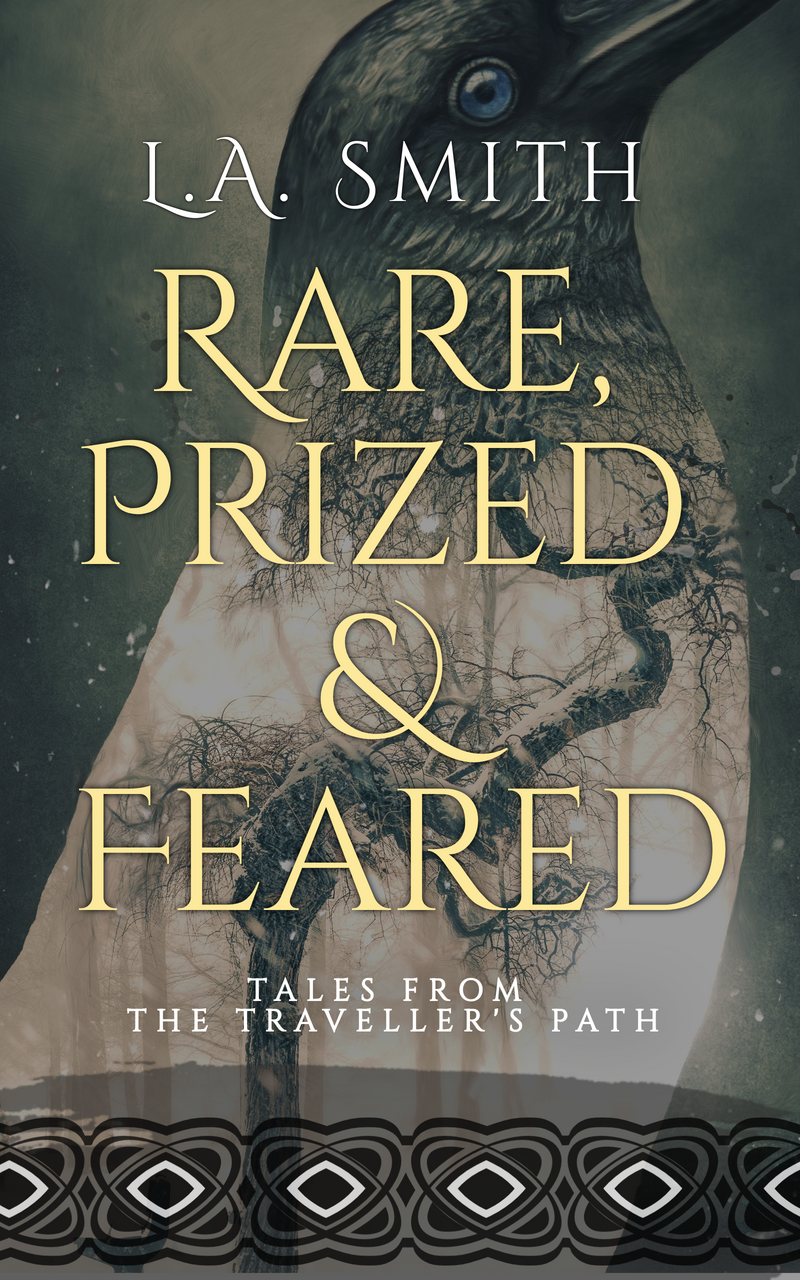
Newsletter
Yes! Send me my FREE short story collection and sign me up for those exclusive subscriber goodies!
We value your privacy, and will never spam you! View our privacy policy at lasmithwriter.com/privacy

Yes! Send me my FREE short story collection and sign me up for those exclusive subscriber goodies!
We value your privacy, and will never spam you! View our privacy policy at lasmithwriter.com/privacy
I am currently forging into revisions on my book, trying to follow my editor’s advice. I would be foolish not to follow it; first of all because I refuse to waste the money I paid her to give me her objective and educated opinion, and secondly, I will be the first to admit that there are lots of people who know a lot more than I do about how to make a story sing, and she is likely one of them.
So, after a month or so of gloom as I digested her advice, I am now ruthlessly doing as she suggests, which could be boiled down to “Look, you don’t have three books, you have one. How about if you take out all the scenes that aren’t necessary and see what happens?” Or, as I am sure she wanted to say but was too professional to do so, “Only one-third of your words are necessary, and instead of enhancing the story, they are bogging it down. Cut, cut, CUT!” Or, as Stephen King succinctly says, “Kill your darlings.”

Oh, it’s hard!
It all boils down to, what is good writing, anyway? Well, one of the ways to find out what good writing is, is to take a look at what good writing isn’t.
Enter our heroine, the famous (infamous?) Amanda McKittrick Ros.
Amanda was born Anna Margaret McKittrick in 1860 in Ireland, and became a teacher. She married Andrew Ross in 1887 and on their tenth anniversary in he financed the publicatioin of her first novel, Irene Iddesleigh, which turned out to be a gift not only to her, but to the whole world.
She wrote under the pen name Amanda McKittrick Ros, which some feel was an attempt to suggest a connection to the influential de Ros family of County Down. This gives you a little hint of her personality.
Let’s put it this way. Our Amanda was nothing if not sell-confident in herself and her writing abilities. She wrote of the “million and one who thirst for aught that drops from my pen”, and predicted that she would “be talked about at the end of a thousand years.” Which is likely true, but I think you might be getting the idea that it might not be precisely for the reason she thought it would be.
Unfortunately, only her first novel, Irene Iddesleigh, is available (for free, on Kindle), unless you want to spend big bucks buying them at auction, if you can find them. She wrote two novels and a couple books of poetry.

Amanda McKittrick Ros (1860 – 1939).
It’s hard to explain her writing without giving you a taste of it, so here is the opening line of Irene Iddesleigh:
Sympathize with me, indeed! Ah, no! Cast your sympathy on the chill waves of troubled waters; fling it on the oases of futility; dash it against the rock of gossip; or better still, allow it to remain within the false and faithless bosum of buried scorn.
Such were a few remarks of Irene as she paced the beach of limited freedom, alone and unprotected. Sympathy can wound the breast of trodden patience,- it hath no rival to insure the feelings we possess, save that of sorrow.
Er. Yes. You are probably starting to get the picture, no?
Ros is championed as possibly the worst writer ever. She was fond (to put it mildly) of what is called “purple prose” – the overuse of adverbs and metaphors to the point of being ludicrous. In fact The Inklings, the writer’s group in Oxford made up of writers C.S. Lewis, J.R.R. Tolkein, and others, famously held competitions to see who could make it through a reading of Ros’ work the furthest without breaking into laughter.
Which would have been hard. I would love to be able to read her poems but they are not in print. But you can find excerpts from some here and there on the internet, including this opening verse to the poem, “Verses on Visiting Westminster Abbey”:
Holy Moses!
Take a look!
Flesh escaped in every nook!
Some rare bits of brain lie here,
Mortal loads of beef and beer.
Her poetry books are called Fumes of Formation and Poems of Puncture. Well it emits fumes, alright, but I’m not sure “formation” is the word I would use to describe the source of the fumes….
Lest you think I am perhaps judging her by the standards of our day, not her own, be assured that the critics of the day did not think too fondly of her works. A copy of Irene was sent to humorist Barry Pain, a contemporary of hers, who in a review called it “a thing that happens once in a million years”. He wrote that he initially was entertained, but soon “shrank before it in tears and terror.”
Mark Twain called Irene, “one of the greatest unintentionally humorous novels of all time.”
I am tempted to feel sorry for Ros, a fellow writer who basically self-published her treasured words and faced the scorn of many. However, she would not accept my pity, I am sure. In her preface to her second novel, Delina Delaney, she called Pain a “clay crab of corruption,” and called others of her critics “bastard donkey-headed mites” and “evil minded snapshots of spleen.”
So, here’s what I need to learn from Amanda McKittrick Ros:
2. If a professional, objective editor tells me I need to cut, I had better cut. So, I going through my book and taking a scalpel (and in some cases, an ax) to it. Scenes that are dead-wood, that don’t move the story along, are gone. As are passages that repeat what I said earlier, and places where there is too much exposition and not enough action. And in general I am tightening everything up, particularly descriptive passages, where I have used too many words to describe something.
How do I do that? Well, for example, here’s a random sentence from Irene, typical of most of them (!), where Ros is describing the garden outside the mansion where Irene lives:
Within the venerable walls surrounding this erection of amazement and wonder may be seen species of trees rarely, if ever, met with; yea, within the beaded borders of this grand old mansion the eye of the privileged beholds the magnificent lake, studded on every side with stone of costliest cut and finish; the richest vineries, the most elegant ferns, the daintiest conservatories, the flowers and plants of almost every clime in abundance, the most fashionable walks, the most intricate windings that imagination could possibly conceive or genius contrive.
Now, if you were Amanda’s editor (one shudders to contemplate it, but play along), how would you suggest she rewrite that?
How about:
The mansion had a beautiful garden.
Or, if you want a little more detail:
Crumbling walls bounded the mansion’s garden, enclosing a beautiful garden. Walking paths wound through it, edged by ferns and delicate flowers, leading to the lake that was in the middle.
That’s still not great, but at least it doesn’t exhaust you, as Amanda’s description does.

It has been hard to do such drastic cutting from my book. Getting rid of two-thirds of it is not easy! And I’m not sure that I will be able to condense it all into one book, to tell you the truth. But I’m going to make the attempt, at any rate, just to see what happens.
It’s interesting. I am finding that as I cut and trim, the story is starting to sparkle, my characters have more room to breathe. Perhaps all those words were tying them down, suffocating them and the story they want to tell.
I’m doing my best to set them free, and with Amanda’s shadow looming over me, I dare not hold them back.
And if I’m tempted to think that I really don’t need to trim quite so much, I shall read the following quote from Irene Iddelsleigh, and get right back to work:
He was tempted to invest in the polluted stocks of magnified extension, and when their banks seemed swollen with rotten gear, gathered too often from the winds of wilful wrong, how the misty dust blinded his sense of sight and drove him through the field of fashion and feeble effeminacy, which he once never meant to tread, landing him on the slippery rock of smutty touch, to wander into its hidden cavities of ancient fame, there to remain a blinded son of injustice and unparalleled wrong!